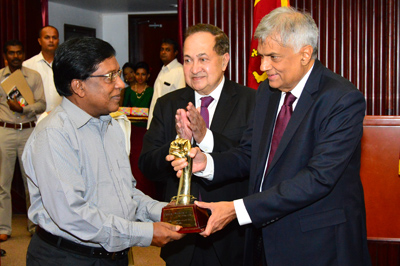News
Lanka’s efforts to be rid of criminal defamation lauded by Indian editor
View(s):Well known Indian editor and newspaper owner N. Ram this week praised Sri Lanka’s decision to repeal laws of criminal defamation and its self-regulatory mechanism for the press saying they were pioneering ventures in South Asia.
Delivering the keynote address of the inaugural Esmond Wickremesinghe award for media freedom, Mr Ram said the credit for this must go to the Ranil Wickremesinghe Government of 2001-2004.

Premier Ranil Wickremesinghe presents the Esmond Wickremesinghe Award for Media Freedom to P. Sarawanapawan, Managing Director Udayan Publications. Chief Guest N. Ram looks on. Pic by Indika Handuwala
The event coincided with the 30th death anniversary of Esmond Wickremesinghe the former Editorial Managing Director of Associated Newspapers of Ceylon Limited (ANCL), and father of Prime Minister Ranil Wickremesinghe.
“There is one key area where Sri Lanka has stolen march over other South Asian nations. It is the first and only country in the South Asian region to have done away with the law of criminal defamation,” he said, adding that credit for this should be given to the Ranil Wickremesinghe government and the parliament.
“In the Indian campaign for decriminalizing the law of defamation, we have been commending to our government and lawmakers what Sri Lanka did as early as June 2002,” Mr. Ram said.
However he indicated that the country still has to improve with regard to the area. Mr. Ram said the Sri Lanka Press Council has powers to haul up for punishment journalists and newspapers for a ‘variety of purported offences and this does not sit well with the modern concept of press freedom.’
“The Press Complaints Commission of Sri Lanka (PCCSL), a self-regulatory mechanism set up by editors and publishers in 2003 and having a well-formulated Editors’ Code, provides a sound and progressive alternative in principle,” he said, adding that it still lacks ‘teeth, including the power to levy fines against offending newspapers’.
I think, he said, the PCCSL as a credible and independent self-regulatory body can be strengthened by statutory underpinning, allocation of adequate funds by Parliament, and provision of an appellate tribunal that will satisfy legal requirements.
He showed this will sit well with the government and parliament to ‘fast-track’ their adaptation of Right to Information Legislation.
Meanwhile also speaking at the event Prime Minister Wickremesinghe explaining the founding of the new award said during the past decade in Sri Lanka the journalistic movement was restricted, media houses closed down, journalists killed and media freedom deteriorated, especially in the electronic and print media, causing an outcry from civil societies demanding a better environment for journalists.
He said when the government started nationalizing the media his father worked and stood at the forefront in the struggle for media freedom.
After ANCL or Lake House was finally nationalised he started the publication of newspapers in Sinhala, Tamil and English laying a foundation for privately run media publications, which proved to be quite successful that the profit obtained from them funded some of the UNP’s projects.
The late Mr. Wickremesinghe addressing the International Press Institute’s (IPI) 24th General Assembly held in Zurich, Switzerland, in 1975 said “They turned out to be a great success, particularly financially. They are run on a very simple formula: publishing all the news the government wants to hide.”
He also served as the Chairman to the IPI from 1966 to 1968 and was among the 50 Press Freedom Heroes selected by the IPI on their 50th anniversary in 2000 for his struggle for media freedom in the country in 1964 and 1973.
He died from illness in 1985.“After 20 years of his death the situation of media freedom deteriorated.
There was a great media restriction for the electronic and print media. Media houses closed down and journalists like Lasantha Wickrematunge were killed,” Prime Minister Wickremesinghe added that his father would have never thought that anyone will have to die fighting for media freedom in Sri Lanka.
This unhealthy situation caused civil societies to come out and call for media freedom and protection. “So to aid the media this award ceremony was organized under my father’s name,” the Prime Minister said.
Civil societies and the media will work together and continue the awards ceremony annually under government funding.
Also speaking at the event the Founding Editor of Divaina Edmond Ranasinghe said the media have a major role to play in a country. Remembering Mr. Wickremesinghe, as he served under him at Lake House, he said that the media operated freely then.
He recalled Mr. Wickremesinghe as a kind and friendly person to work with. Mr. Ranasinghe said that it is important to follow Mr. Wickremesinghe’s principles for media freedom.
The Esmond Wickremesinghe Award for Media Freedom 2015 was presented to Udayan Publications and was received by its Managing Director P. Sarawanapawan.
Udayan Publication was selected for their outstanding and continuous work in reporting of issues especially in the Northern Province, even while their journalists were killed, threatened and assaulted on many occasions.
The jury of the award included the Trikone Cultural Foundation head Dharmasiri Bandaranayake, Director of SAARC Cultural Centre Wasantha Kotuwelle, Secretary to the Prime Minister and Chairman of Public Performance Board Saman Athaudahetti and owner of Surasa Publications Prem Dissanayake.
The High Commissioner of India Y. K. Sinha, parliamentary members and ministers, editors of media houses and journalists participated at the event.

